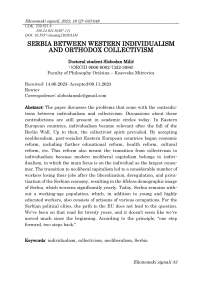Serbia between western individualism and orthodox collectivism
Бесплатный доступ
The paper discusses the problems that come with the contradictions between individualism and collectivism. Discussions about these contradictions are still present in academic circles today. In Eastern European countries, individualism became relevant after the fall of the Berlin Wall. Up to then, the collectivist spirit prevailed. By accepting neoliberalism, post-socialist Eastern European countries began economic reform, including further educational reform, health reform, cultural reform, etc. This reform also meant the transition from collectivism to individualism because modern neoliberal capitalism belongs to individualism, in which the main focus is on the individual as the largest consumer. The transition to neoliberal capitalism led to a considerable number of workers losing their jobs after the liberalization, deregulation, and privatization of the Serbian economy, resulting in the lifeless demographic image of Serbia, which worsens significantly yearly. Today, Serbia remains without a working-age population, which, in addition to young and highly educated workers, also consists of artisans of various occupations. For the Serbian political elites, the path to the EU does not lead to the question. We've been on that road for twenty years, and it doesn't seem like we've moved much since the beginning. According to the principle, "one step forward, two steps back.".
Individualism, collectivism, neoliberalism, Serbia
Короткий адрес: https://sciup.org/170203953
IDR: 170203953 | УДК: 330.831.8; 338.24.021.8(497.11) | DOI: 10.5937/ekonsig2302033M
Список литературы Serbia between western individualism and orthodox collectivism
- Анђелковић, П. М. (2011). Српско друштво на вододелници – некад и сад. Зборник радова Филозофског факултета у Приштини, (41), 489-501.
- Анђелковић, П. (2016). Kа домаћинској економици: социолошки огледи. Kосовска Митровица: Филозофски факултет.
- Анђелковић, П. (2017). Човек је човеку вук и (или) човек је човеку нада: парадигме западног и православног човека. Црквене студије, Ниш, (14), 195-208.
- Антонић, С. (2013). Пинк транзиција у Србији - шест теза за разумевање наших културних прилика. Kултура, (140), 272- 292.
- Берђајев, Н. (2001). Философија неједнакости. Пoдгoрицa: Oктoих.
- Берђајев, Н. (2006). Судбина човека у савременом свету: за разумевање нашег времена. Београд: Логос.
- Бодсон, Ж. (1994). Европа апатрида. Београд: Завет.
- Darwish, A. F. E., & Huber, G. L. (2003). Individualism vs collectivism in different cultures: A cross-cultural study. Intercultural education, 14(1), 47-56.
- Dobrijević, R. I. (2006). The Orthodox Spirit and the Ethic of Capitalism: a case study on Serbia and Montenegro and the Serbian Orthodox Church. Serbian Studies: Journal of the North American Society for Serbian Studies, 20(1), 1-13.
- Drašković, B. (2015). Neoliberalna doktrina i ekonomska politika u Srbiji. U I. Stošić (Ur.). Strukturne promene u Srbiji – Dosadašnji rezultati i perspektive (str. 15-31). Beograd, Republika Srbija: Institut ekonomskih nauka. http://ebooks.ien.bg.ac. rs/59/
- Душанић, Ј. (2013а). Неолиберализам, транзиција и криза. Београд: Београдска пословна школа. http://dusanic.rs/ntt.pdf
- Душанић, Ј. (2013б). У загрљају неолибералне хоботнице. Београд: Институт за еконо-мскоправне експертизе. http:// dusanic.rs/nht.pdf
- Душанић, Ј. (2014). Економија постмодерне и криза економске науке. Досије студио. http://dusanic.rs/EPtxt.pdf
- Gajda, A., & Oie, M. (2017). Between individualism and collectivism: Perception and profiles of creativity in Poland and Japan. Creativity. Theories–ResearchApplications, 4(2), 198-217.
- Gelfand, M. J., Bhawuk, D. P., Nishii, L. H., & Bechtold, D. J. (2004). Individualism and collectivism. Culture, leadership, and organizations: The GLOBE study of, 62, 437-512.
- Kirby, B. (2019). Pentecostalism, economics, capitalism: putting the Protestant Ethic to work. Religion, 49(4), 571-591.
- Klein, N. (2002). No Logo. VBZ.
- Klein, N. (2008). Doktrina šoka: uspon kapitalizma katastrofe. VBZ.
- Mamontov, V. D., Kozhevnikova, T. M., & Radyukova, Y. Y. (2014). Collectivism and individualism in modern Russia. Asian Social Science, 10(23), 199.
- Марковић, С. (2021). Изабрани списи. Бeoгрaд: Пoртaлибрис.
- McCleary, R. M., & Barro, R. J. (2006). Religion and economy. Journal of Economic perspectives, 20(2), 49-72.
- Nelson, R. H. (2010). Max Weber Revisited. Religion, economy, and cooperation, 49, 157.
- Rusu, R. (2018). The protestant work ethic and attitudes towards work. Scientific Bulletin, 23(2), 112-117.
- Соловјов, В. (2010). Предавања о богочовечанству. Београд: Логос.
- Veber, M. (2018). Protestantska etika i duh kapitalizma. Novi Sad: Mediterran Publishing.
- Vratuša-Žunjić, V. (1995). Razvoj, religija, rat. Beograd: Institut za sociološka istraživanja Filozofskog fakulteta.
- Internet sources
- Demografski problemi i populaciona politika Srbije. Geotesla, 02.02.2020. https://geotesla.wordpress.com/2020/02/02/demo grafski-problemi-i-populacionapolitika-srbije/ [08.03.2023].
- Grigorije: I kad se razgraničimo živećemo jedni sa drugima. Danas, 04.10.2019. https://www.danas.rs/politika/grigorije-i-kad-se-razgranicimo-zivecemojedni-sa-drugima/ [05.03.2023].
- Programeri su skinuti sa trona i ovo je zanimanje od kojeg se u Srbiji zapravo najbolje zarađuje. Noizz, 03.01.2021. https:// noizz.rs/noizz-news/ najplacenije-zanimanje-usrbiji/kjv2tyy [08.03.2023].
- Za godinu dana Srbija izgubila 37.000 stanovnika. BIZLife, 01.07.2020. https://www.bizlife. rs/za-godinu-dana-srbija-sesmanjila-za-37-000-stanovnika/ [08.03.2023].


